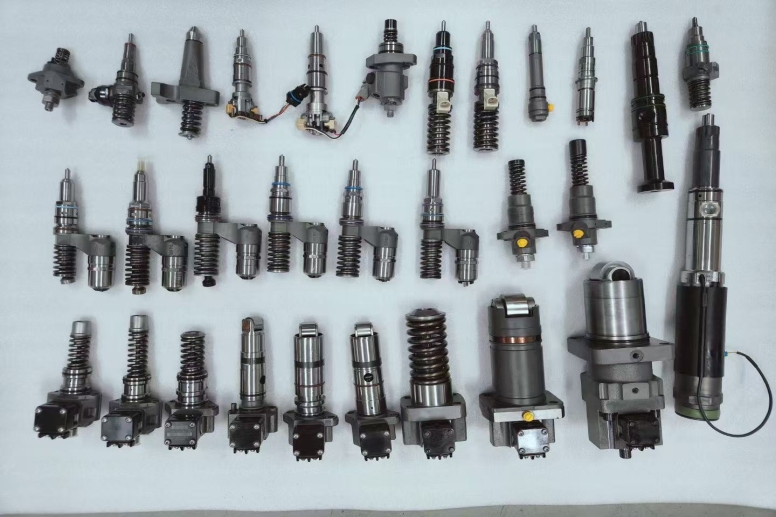
Identifying Common Signs of Fuel Injector Failure
Fuel injectors are critical components of your vehicle's fuel system, delivering precise amounts of fuel to the engine. When they start to fail, you may notice several common symptoms:
1. Engine Misfires or Rough Idling
The engine may sputter, shake, or hesitate during acceleration.
Rough idling (uneven RPMs) can occur due to inconsistent fuel delivery.
2. Poor Fuel Economy
A clogged or leaking injector can cause either too much or too little fuel to enter the combustion chamber, reducing mileage.
3. Check Engine Light (CEL) Illuminates
Faulty injectors can trigger error codes like P0171 (Lean Fuel Mixture), P0300 (Random Misfire), or P0201-P0208 (Injector Circuit Malfunction).
4. Fuel Smell or Leakage
A leaking injector can cause a strong gasoline odor near the engine bay or under the car.
5. Engine Stalling or Hard Starting
If an injector is clogged, the engine may struggle to start or stall unexpectedly.
6. Uneven Acceleration or Power Loss
Hesitation, jerking, or lack of power during acceleration due to improper fuel spray.
7. Excessive Exhaust Smoke
Black smoke indicates too much fuel (rich mixture).
White smoke may indicate a leaking injector, allowing fuel to enter the combustion chamber when the engine is off.
8. Dirty or Clogged Injector Symptoms
Poor performance at low speeds.
Engine knocking or pinging from lean conditions.
How to Confirm Fuel Injector Failure?
Use an OBD-II scanner to check for related trouble codes.
Perform a fuel injector balance test (requires special tools).
Listen for clicking sounds (a healthy injector makes a consistent ticking noise).
Inspect for leaks (visual check around injectors).
Solutions
✔ Clean clogged injectors (using fuel additives or professional cleaning).
✔ Replace faulty injectors if cleaning doesn’t help.
✔ Check fuel pressure to rule out pump or regulator issues.
Common Causes of Injector Failure
It’s not enough just to know the signs that something is wrong in your engine. You need to know what exactly might be going wrong. Here are some things that might cause your injectors to fail:
Fuel injectors can fail due to various reasons, often related to fuel quality, wear and tear, or external factors. Here are the most common causes of fuel injector failure:
1. Dirty or Contaminated Fuel
Low-quality gasoline with impurities can clog injectors over time.
Dirt, rust, or debris from a dirty fuel tank or failing fuel filter can block injector nozzles.
Ethanol-blended fuels (E10, E15) can attract moisture, leading to corrosion.
2. Carbon Deposits & Varnish Buildup
Over time, fuel residues can form carbon deposits on injector tips, disrupting spray patterns.
Long periods of inactivity (e.g., storing a car without fuel stabilizer) can cause varnish buildup.
3. Fuel Injector Wear & Tear
High mileage can cause internal components (seals, solenoids) to wear out.
Electrical failures (e.g., damaged wiring or corroded connectors) can prevent proper operation.
4. Leaking Injectors
Worn O-rings or seals allow fuel to leak externally or internally.
Excessive heat or pressure can crack injector bodies.
5. Overheating & Engine Heat Damage
Frequent short trips prevent the engine from reaching optimal temperature, leading to carbon buildup.
Faulty cooling systems can cause excessive engine heat, damaging injectors.
6. Poor Maintenance Habits
Infrequent fuel filter changes allow contaminants to reach injectors.
Ignoring fuel system cleanings (every 30,000–50,000 miles) accelerates deposit buildup.
7. Incorrect Fuel Pressure
Faulty fuel pump or regulator can cause too much or too little pressure, stressing injectors.
Running the fuel tank extremely low increases the risk of sediment entering the system.
8. Bad Gasoline Additives or Wrong Fuel
Aftermarket additives (especially cheap cleaners) can sometimes harm injectors.
Using diesel in a gasoline engine (or vice versa) can cause severe damage.
How to Prevent Fuel Injector Failure?
✔ Use top-tier gasoline (brands with good detergents).
✔ Replace the fuel filter as recommended.
✔ Add a quality fuel injector cleaner periodically.
✔ Avoid running the tank empty.
✔ Fix engine issues (misfires, overheating) promptly.
